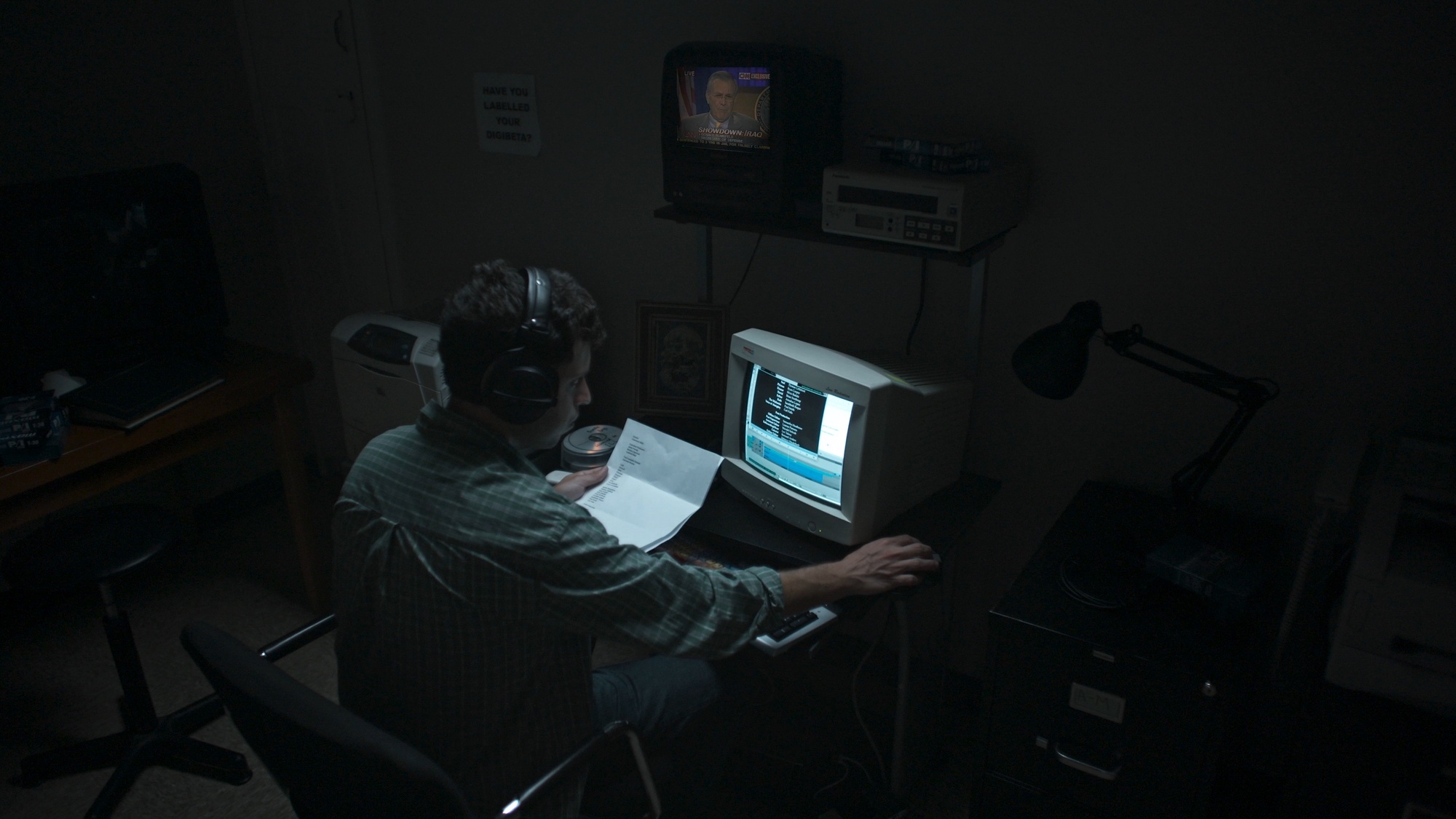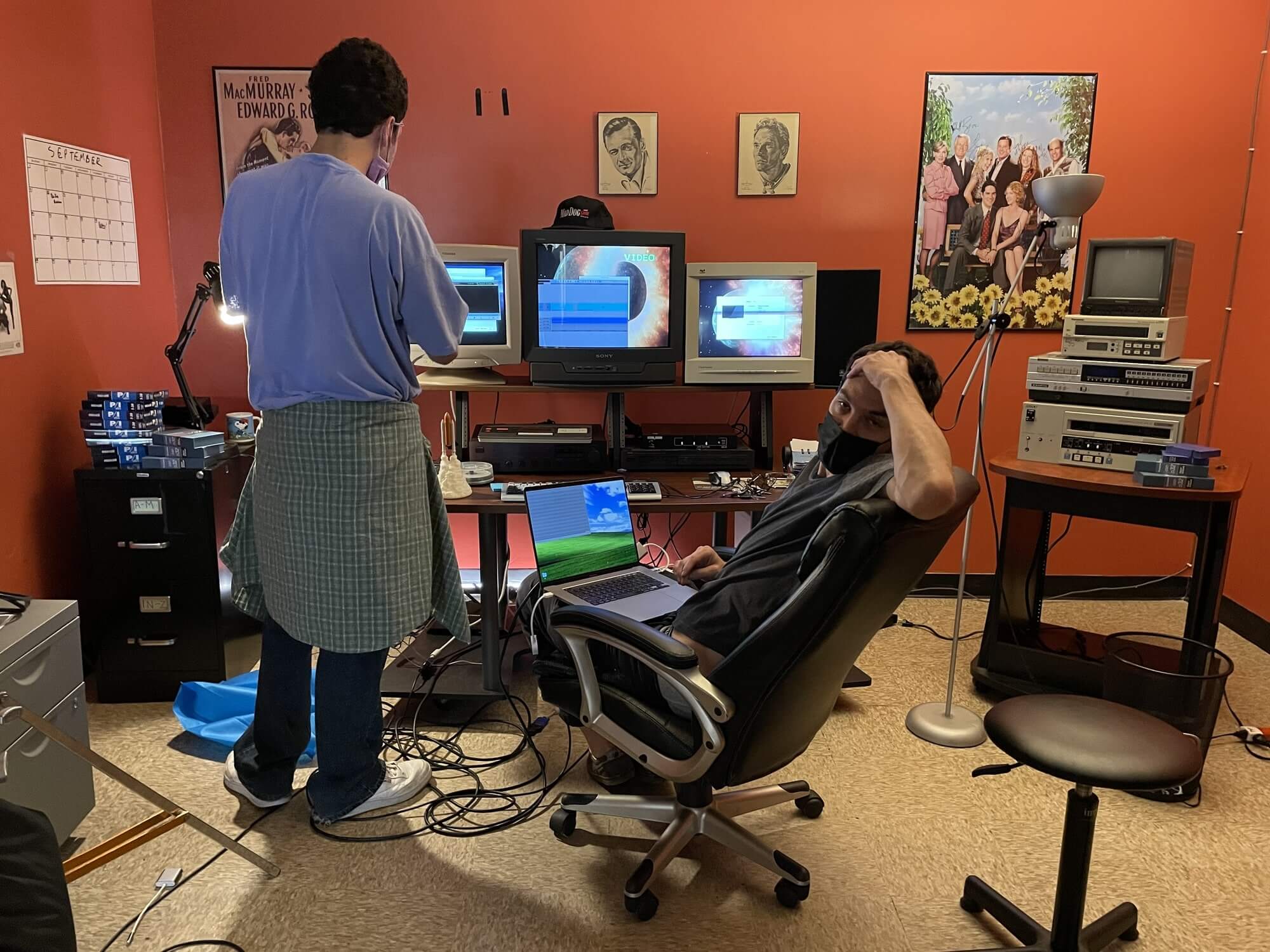
After 9/11, the world of American film and television was never quite the same again. There were the obvious changes, like the gritty new Bond, the hardened Jason Bourne films and a new seriousness in disaster films. But behind the scenes, hundreds of smaller, subtler changes took place, including the unglamorous job of removing references to the Twin Towers across a variety of media. Dustin Waldman expertly takes us into the world of post-production editing, focusing on one man’s surprisingly emotionally-charged decision whether or not to scrub the buildings from the opening credits of The Sopranos. Using close-ups, ambient music and powerful, nuanced performances, Never Fuggedaboutit immerses you in the details, providing a strangely touching mixture of patriotism, compromise and humour. Ahead of today’s premiere, we talked to Waldman about why Tony Soprano is a uniquely American character, sourcing vintage equipment off eBay, his own experience working as an editor and his personal relationship to 9/11.
Despite only being seven at the time, I remember 9/11 rather vividly. It’s arguably the most potent cinematic image of the 21st century, especially the way it’s been seared into everyone’s brain. Do you have memories of that day and its after-effect on popular culture?
I was ten, and I remember going home from school early and just watching the clip on a loop. Horrifying, hard to forget and I think a fundamentally mind-altering experience for everyone in the US at the time. Then I remember a year later, on the anniversary, one of the local radio stations in South Florida played Puff Daddy’s I’ll Be Missing You on loop all day, which I thought was strange. I guess I’m still thinking about it. There were all these weird little ways that the culture tried to process this trauma and course correct the cultural mores for the new world we were entering.
You’re the one with your hands on the keys, but you’re processing someone else’s sensibility.
I love the minutiae of editing involved here. Does this speak to your own experience when working as an editor?
Definitely. In my early years when I was still working as an assistant, I worked at a lot of scrappier operations, and though the characters are all fictional, that sort of oppressive vibe is something I bet a lot of AEs know well. Then, from the lead editor character’s perspective, I think he is sort of reacting to this weird sense of both power and powerlessness editors have. You’re the one with your hands on the keys, but you’re processing someone else’s sensibility. It’s an interesting job. The editing it out scene was actually supposed to be even more in the weeds editing nerd stuff – comparing timecodes and working within the Avid sequence – but I’m glad we ended up focusing it more dramatically the way we did.

I’d love to know if this was based on a true story, or more of an imagining of the process you’d imagine this company went through for editing The Sopranos.
The shot was really removed from the intro, but the film is a work of fiction. There’s a little New York Times blurb from 2002 about the new season of the show premiering with the shot removed, but they don’t mention anything about the post side of things. I actually didn’t see that article until I had already written the script.
What I found particularly ironic about the patriotic montage that reworks the credit sequence is how it makes Tony Soprano to be this particularly American icon, when of course, he is a mafioso boss! Was it fun to play around a little bit with this paradox?
I think The Sopranos is one of the greatest works of American fiction ever made. I was turned off by it for a long time, but my fiancee and I finally binged it during COVID and I fell in love. What I realised is that Tony is like the Ur-American Suburbanite. Sure, the story is elevated by the mob stuff, but his essential problems are basically the same as his neighbours. He runs a little business fiefdom and has all the creature comforts of the American Dream, but he’s essentially alienated from everyone around him.
I think Tony is a uniquely and profoundly American character.
I also really connect to his relationship with his roots and think that type of conflicted identity is a pretty unique American thing. I think one of the best episodes is when Tony and the gang go to Italy and they find themselves confronted with how American they are, in contrast to how they perceive themselves. I love when Paulie’s having his cappuccino in the plaza next to the old dudes and he goes “Commendatore!” only to be ignored. Deep, hilarious and heartbreaking stuff. Anyway, I think Tony is a uniquely and profoundly American character.

I loved the production design, which really brings out the dinginess of post-production studios. What was it like finding the right location and recreating 2002 on film?
Thank you! That was very important to me. In terms of the location, I looked at a bunch of modern post-production studios, but there was something just too chic and cozy about all of them. Plus it posed a lot of production issues because most modern post houses have wall mounted, extremely expensive 4k TVs and stuff everywhere now, which would have limited how we could shoot scenes. I remembered this location from another short I made, which is a multi-use space in Fort Greene called Trilok Fusion Center, and how they had some post suites as well. They were great to work with and we were able to use a bunch of different offices. Other than some of the tables and stands, we basically brought in everything.
It was extremely fun gathering all the period-appropriate editing gear. It was a combination of many late nights buying stuff off of eBay, borrowing gear from friends, renting from prop houses and travelling all over the state to pick up stuff I bought off of Craigslist. I also couldn’t have done it without my production designer and set decorators who really helped make it feel real and lived in.

There’s also this exploration of making choices like this in terms of sacrificing something essential for career advancement. Do making these kinds of big choices weigh on editors? Do you have experience of being put in this kind of situation?
I think you reach a point on every project as an editor where you have to make a decision if you’re going to play ball or not. Many editors are also filmmakers with our own sensibilities, but ultimately in these jobs you’re not the one calling the shots. That means that there comes a point in the process where you’re either going to have to overstep your job description, or stay humble and say: “You got it, boss.” Sometimes this can be harder than others, and so it’s kind of this internal battle of suppressing one side of yourself and doing the work. This is especially true in situations where you’re working with bigger companies that can begin to feel like you’re really just a cog in an uncaring machine. On the flip side, I will say I think this aspect of the job has actually made me a better filmmaker, because I also get to collaborate with artists who have different instincts and would do things I wouldn’t, and so ultimately it expands your toolkit, but like most productive things it can be an uncomfortable feeling.
I think you reach a point on every project as an editor where you have to make a decision if you’re going to play ball or not.
The strong contrasts and off-kilter close-ups help to immerse us in the pressure of making this choice. How did you think about it visually?
A huge influence on this movie is the documentary The Beginning: Making Star Wars Episode 1. Nick Nazmi showed it to me and it changed my life. I don’t care about Star Wars really, but that documentary – especially the post-production stuff – is a truly amazing time capsule of a disruptive moment. It’s like Burden of Dreams for the early digital era. But while that was an influence, that doc style only takes you so far visually and I’m interested in a more expressive style in movies. I always want to elevate and ratchet up the tension in what can otherwise be kind of boring visual spaces and setups. Especially because that’s how it feels a lot of the time in the edit. I also have to give a lot of credit to my Director of Photography Matt Clegg, who has a great way of helping me translate visually what’s in my head.







When I think of 9/11 and music, The Disintegration Loops comes to mind. Was this an influence on the music of your short, which has a similar ambient tone? I’d love to know a lot more about the music in the film as well as the sound design.
I love a lot of Basinski’s stuff and that’s super interesting you mention him, since we used a lot of his music for a feature doc I was an editor on before I shot this movie. I hadn’t made that connection before, but I’m sure it seeped into my subconscious. The score for this was done mostly by a composer Nick Nazmi introduced me to, Dillon Terry, who made some amazing work. I love that little blippy sound he uses sometimes; it makes you aware of the speakers in a way that I think is really cool given the subject matter. He had a lot of interesting ideas about how to sort of sonically translate the editing experience into music.
I always want to elevate and ratchet up the tension in what can otherwise be kind of boring visual spaces and setups.
Overall, we wanted to use the sound and music to maximise the tension, but not overplay our hands to the point that it’s distracting. It’s a balance and Dillon was kind enough to send us stems, so we were able to work really dynamically with his music in the edit. I also asked him to send us little brief ‘bumper’ melodies, which I think helped give a vibe and like, fatalism, to many of the transitions.

I love how by the end you even manage to recreate part of the opening sequence itself, as the car moves through New York to New Jersey. What was it like creating this sequence and was it difficult to avoid anything that looked more modern-day?
Thank you! That was fun to shoot, it was just me, Nick and Peter Peregrine (our second unit DP who also shot the bar scene) driving around for a day. It’s such an iconic series of shots, it was a fun exercise to kind of loosely recreate it. There is an amazing Sopranos fan community online who have broken down the locations in the intro shot by shot, but for this, I wasn’t so interested in doing it precisely as much as I was just evoking a memory or idea of it. We definitely had to cut around some more modern-looking stuff, but it wasn’t too bad.
What are you working on next?
I just finished a first draft of a feature, and I’m extremely excited about it. I’m working on the second draft now and hope to shoot late next year. As an editor, I’m working on a project with Director Lance Oppenheim.


